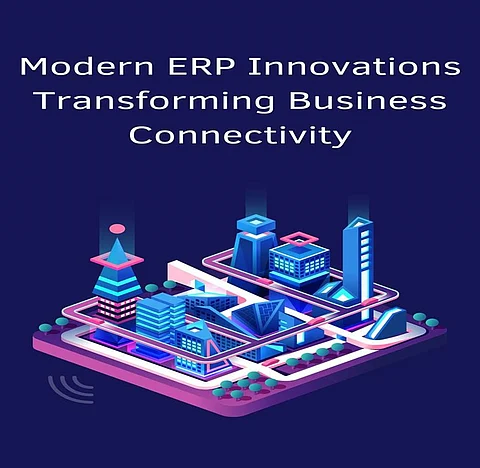

In today's fast-paced technological landscape, businesses continuously seek innovative solutions to enhance operational efficiency and collaboration. Modern Enterprise Resource Planning (ERP) systems have evolved significantly, incorporating cutting-edge technologies that drive digital transformation. This article explores key advancements shaping ERP systems, from cloud-based integrations to artificial intelligence. Authored by Ravi Sankar Korapati, a seasoned researcher in ERP advancements, this discussion highlights the transformative impact of these innovations.
The cloud-based integration is one of the most notable advances in ERP, facilitating different business functions. Integration Platform as a Service (iPaaS) is considered a paradigm shift as it enables the organization to make things pretty easy for the data flow across the clouds or on-premise applications. With automated API management and real-time data synchronization, iPaaS helps the business operate more nimbly and with fewer complexities in integration. In addition, it reduces the need of point-to-point connections for greater scalability using Enterprise Service Bus (ESB) architectures, thereby making communication centralized.
Microservices are beginning to replace traditional monolithic ERPs as they become more modular and flexible. This allows businesses to easily update or scale some service areas without affecting the delivery of the services from the whole system. Thus, microservices architecture brings about increased operational resilience, as the business can easily adapt to changing business needs. Resource utilization is maximized, maintenance streamlined, and technological improve flexibility for businesses leveraging this approach.
Blockchain technology is redefining data security and transparency within ERP systems. By implementing decentralized ledgers, businesses can enhance transaction verification processes and reduce the risk of fraud. Blockchain integration ensures that all data modifications are recorded immutably, fostering trust among stakeholders. Industries that require stringent compliance and audit trails, such as supply chain management, have particularly benefited from blockchain-enabled ERP solutions.
From the very beginnings of the industry, integrating IoT with ERP systems has taken off massively, bringing massive transformation in sectors like manufacturing, logistics, and transportation, among many others. These sensors will give real-time data about levels of inventories, cycles of production, and even performance of machines hence leading to optimized operations. This will enable organizations to prevent downtimes, reduce wastages, and improve production efficiency based on the above feature. With IoT-enabled ERP systems, organizations now rely on data-driven decisions, leading to improved productivity while reducing expenditure.
Modern ERP solutions increasingly prioritize mobile accessibility, enabling employees to access critical business data on the go. Mobile ERP applications provide real-time updates, ensuring teams remain connected regardless of location. This feature is particularly valuable for organizations with distributed workforces, improving responsiveness and operational continuity. By offering user-friendly interfaces and secure access mechanisms, mobile ERP systems enhance workforce productivity and decision-making.
Artificial intelligence (AI) transforms ERP systems by providing predictive analytics, automation, and intelligent decision-making capabilities. AI-driven ERP solutions analyze vast business data to identify trends, optimize workflows, and provide actionable insights. AI integration enhances efficiency across various business functions, from demand forecasting to automated financial reporting. Companies leveraging AI-powered ERP systems can make more informed strategic decisions, improving overall business performance.
Maintaining data governance and compliance is crucial as ERP systems become more interconnected. Robust data governance frameworks ensure data accuracy, security, and regulatory adherence. Businesses implementing effective data management strategies experience fewer compliance risks and improved data quality. Ensuring standardized data definitions and ownership structures within ERP systems enhances system reliability and user confidence.
ERP systems need continuous improvements to stay relevant in a changing business environment. Organizations that build in continuous improvement run regular assessments of their systems to seek inefficiencies and improvements. User feedback is invaluable in this regard in identifying usability problems and non-functional requirements. Continuous training supports users in keeping their skills up-to-date in the operation of the system, then apply those skills to troubleshoot and make improvements. This training, along with monitoring system performance and making data-driven iterative improvements to boost productivity and operational efficiency, allow business organizations to align ERP capability with new technology and changes in business need, thereby future-proofing their systems. In doing so, some operational bottlenecks are dropped and sustainable competitive advantage maintained. Proactively optimizing the ERP overtime ensures enduring value and adaptability in a fast-changing digital environment.
Ravi Sankar Korapati mentions how advancements in technology have revolutionized modern-day ERPs. Cloud computing, microservices, blockchain, IoT, AI, and mobile accessibility have changed the ways of a modern-day business in its operations and collaborations. Firms embracing these innovations are bound to achieve better efficiency, security, and scalability with their operations. As ERPs continue to evolve, it is imperative for businesses to begin embracing these technologies in order to remain relevant in the increasingly digitized environment.
